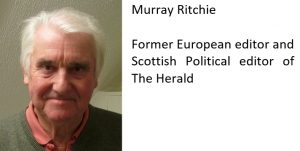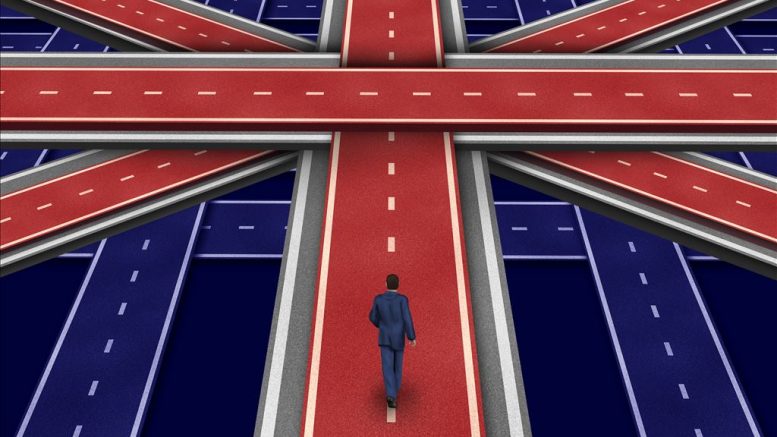Could England, Scotland, and Wales become independent states in some form of confederal United Kingdom? The odds are getting shorter, writes Murray Ritchie
In the time of Covid with its attendant social and economic chaos, and the looming horrors of Brexit on the near horizon along with soaring support for Scottish independence, Britain’s Conservative government has begun to panic about the constitutional future of the so-called United Kingdom.
United, in this context, is not the appropriate word. An unpopular Tory government appears to be doing its best to make Britain ever more disunited. Michael Gove, minister for the Cabinet Office (and a Scot) has been given the job of setting up a team tasked with stopping the break-up of the country into independent parts. He must like a challenge.
Boris Johnson, prime minister and self-appointed minister for the Union, has come late to confronting the probability that Scotland is heading for independence. Hitherto constitutionally docile Wales is now experiencing a wave of nationalism which has set alarm bells ringing in London. And there is always the Irish question and talk of reunification of British Northern Ireland and the Republic.
Add to the mix a new Brexit-fuelled English nationalism and the result is a constitutional nightmare.
An unpopular Tory government appears to be doing its best to make Britain ever more disunited.
The gloomy Conservatives are now friendless outside England. One former Tory MP, Lord Patrick Cormack, remarked: “It would be a constitutional and political tragedy if, a decade from now, we had Northern Ireland broken away, maybe Wales, but almost certainly Scotland.” That view sums up Tory attitudes of regret and a dread of inevitability.
Let’s leave Northern Ireland aside for the moment. It presents a different set of challenges from Scotland and Wales. If Scotland does vote for independence that inevitably means England and Wales become a new and independent entity. What would it be called? Probably “England” in the view of Sir Simon Jenkins (good Welsh name), but one imagines the Welsh might have very different ideas.
As befits their Sunday title of Conservative and Unionist Party, the British Tories are the traditional upholders of the Union of Scotland and England but they are finding that justifying the crumbling status quo is a struggle for many reasons, not least the twin evils of Covid and Brexit.
Brexit pulled Scotland out of the European Union against the will of its people who voted 62 per cent Remain. Tories now find Brexit’s myriad complications increasingly damaging their relations with Wales and Scotland because London intends to intercept powers being returned from Brussels to the UK’s devolved administrations in Edinburgh and Cardiff.
A “naked power grab” the Welsh leader, Carwyn Jones, called it in 2017 with the full support of Nicola Sturgeon, his counterpart in Scotland. It is impossible to disagree.
Devolved powers currently enjoyed by the Scots and Welsh governments – food standards are the outstanding example – will be seized on their way to Edinburgh and Cardiff so that the UK government can smooth its proposed British internal market. This means that Scotland and Wales would, for example, be unable to prevent the import of American chlorinated chicken if the UK and US signed a trade deal.
This cavalier treatment of devolution – now 20 years old and working well enough to make the Scots and Welsh determined not to have it snatched away – is building resentment enough to cause the “break-up of the United Kingdom”. This is the emotive phrase popular with Unionists but not entirely accurate.
A brief history lesson in constitutional technicalities.
The United Kingdom dates from the Union of the Crowns in 1603 and is simply the kingdoms of England and Scotland united under one monarch, firstly the Scottish King James VI who became King James 1 of England and ordered the design of the famous Union flag.
For more than 100 years Scotland and England remained independent countries within the United Kingdom until the union of parliaments in 1707. A return to that arrangement is beginning to look increasingly probable. Britain’s parliamentary union would indeed break up with Scottish independence but the United Kingdom under one monarch would continue at least until one or other, probably Scotland, decided to become a republic.
Tories have been watching in horror the rising support for Scottish independence – a record 58 per cent in one recent opinion poll. A run of 11 polls has shown all with majorities for independence. An unprecedented fact.
In this new political territory Nicola Sturgeon’s governing Scottish National Party is under severe pressure from its more impatient supporters to demand a second independence referendum. Given that the first one in 2014 began with support for independence around 30 per cent and reached 45 per cent, the signs are that support in the mid-50s is a great starting point for indyref2.
Boris Johnson is widely held to have made a mess of dealing with Covid and is accused of putting the economy ahead of people’s lives. In Scotland the opposite is the case. Sturgeon is widely perceived to have handled the crisis well – though the record shows the death rate is not much better than England’s – and her frequent televised talks to the Scottish people have suggested she is a caring and competent leader.
Her popularity ratings are at a height never before enjoyed in Scotland by any politician. This represents a level of trust which Johnson can only dream of. Scottish voters know Sturgeon’s record in health and education, devolution’s major areas, is not great yet they seem to trust her to get it right eventually.
The United Kingdom of British Independent States has a grand ring to it but it would be a very different United Kingdom from the one we know now. Constitutionally it would bear more resemblance to the European Union.
Two decades ago, when Labour set up the devolved administrations it was assumed, correctly, that they would also be run by Labour thus ensuring no conflict with Westminster. In Scotland the voting system was rigged to ensure the separatist SNP could never win a majority. Big miscalculation.
Politicians in London failed to recognise that even friendly governments in Edinburgh and Cardiff would want to do their own thing with their new powers and not blindly follow Westminster’s beckoning. Covid has proved that devolution has given real authority to Scotland and Wales whose leaders have come to guard it jealously.
In recent times all the Unionist parties have talked of federalism as the answer. So far it has been just that – talk. Federalism won’t stop the SNP of course because federalism is not independence. And so confederalism beckons where the newly independent states of the British mainland might group together, however loosely, while preserving the title United Kingdom.
The United Kingdom of British Independent States has a grand ring to it but it would be a very different United Kingdom from the one we know now. Constitutionally it would bear more resemblance to the European Union.
Like the EU this reformed UK’s constituent parts would require to share some sovereignty which Scotland would be reluctant to cede having just recovered it the hard way. There would be significant challenges, not least the border with England outside the EU and Scotland possibly back in it. Norway and Sweden could provide a case study.
Confederalism looms ever closer. If the political current continues its present course the time will come when it is the best Britain’s unhappy Unionists can hope for.

Headline Photo Credit: Lightspring/Shutterstock.com





King James 1 ordered the creation of the Union flag in the early 1600s – one and a half centuries before the British arrived in Australia, which makes me wonder why on earth the Union flag continues to be part of the Australian flag.
Surely, time is long past since Australia had a flag entirely of Australian design…the aboriginal flag being a perfect substitute.